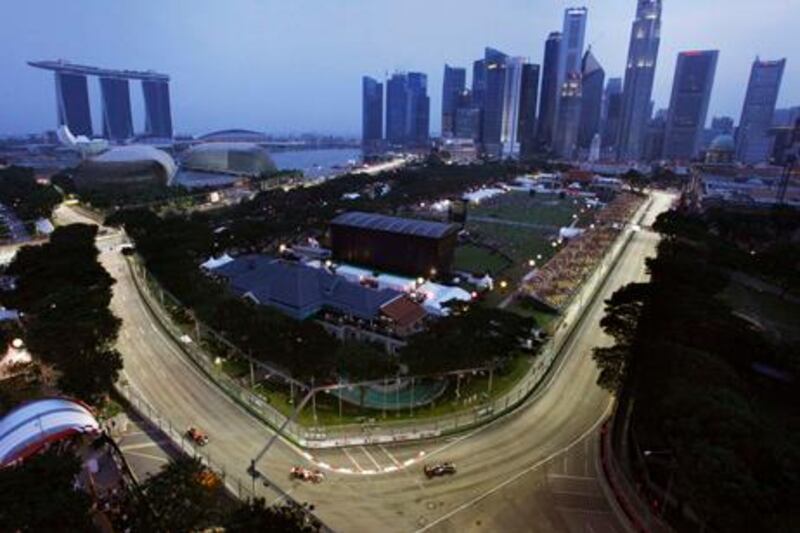The only thing as inescapable as Singapore's enervating humidity is its gridlocked traffic on grand prix weekend. Brake lights are omnipresent, taxis display red occupied signs and road cones direct the flow into a one-way labyrinth.
But while today sees Singapore host its fourth annual Formula One race, patience is wearing thin for residents affected by the upheaval involved in the temporary construction of the city's Marina Bay Street Circuit.
"I am a taxi driver, so for me it's a pain," said Chee Yeung, sitting in his stationary car yesterday afternoon en route to the Swissotel Stamford, located in the heart of the metropolis.
"There are too many diversions and one-way roads. It's a real headache."
Rather than experiencing a spike in customers, Yeung said that his business is negatively affected because it takes so long to get anywhere.
This year, four hotels have formed allegiances with taxi companies in a bid to quell congestion. The result: instead of customers being forced to wait for up to an hour for a regular taxi, they can hire a limousine for a set fee of S$40 (Dh113).
Yet the congestion is not only on the weekend of the race; work on the temporary street circuit begins as early as May and lasts for several weeks after today's podium celebrations.
The hassle has been acknowledged by the local government, which funds 60 per cent of the event's cost: Singapore's contract expires in 2012 and no decision has yet been made on whether to renew the deal after next year's race has been staged.
"It's still in negotiations", said Teo Ser Luck, the minister for trade and industry.
"But it's more important to see if the F1 races have met our objectives and truly brought value to Singapore and helped put Singapore on the international stage.
"It's brought value in the motor sports scene, but the considerations have to be more than that. So whether it is economic or social, we have to examine each of the factors, which is the stage where we are at now."
Shops and restaurants in the city remain largely unaffected by the circuit's twisting, intruding track, while the national tourism board said they expect revenue from this weekend's event to reach around S$200 million.
With the race costing approximately S$150m to organise, the result is Singapore being one of the sport's few profitable grands prix on the calendar.
Yet rumours are growing that even if the contract is extended, the circuit could be moved out of the city.
"I love the grand prix, but I don't love the grand prix here," said Yeung, growing increasingly frustrated from his taxi's lack of progress in the downtown traffic. "The sooner the race moves to the airport the better."
Perhaps better, but unlikely to happen.
A new circuit near to the Changi international airport is under construction, but it has suffered serious delays due to financial problems. Also, it does not meet the standards required to host a Formula One race.
Another future venue being touted is Singapore Sports Hub, a proposed complex similar to Zayed Sports City. It is based in Kallang, an area north of the city centre.
Government officials from the Singapore Sports Council were unavailable for comment, but local media experts dismissed suggestions that the race would leave Marina Bay.
Terrence Voon, a sports journalist with The Straits Times, said "if the grand prix stays in the country, it will stay at Marina Bay. Definitely, 100 per cent."
Besides, not everybody is troubled by the congestion. Leister Neo, a public relations associate with Golin Harris, said the city's residents have learned to live with the commotion of construction.
"I don't take too much of an interest in the Formula One, so the event to me is just something that happens every year and takes over the city for a few weeks.
"The first two years were lots of hassle, but last year and this year it's not so much of an issue as we know where not to try to go. You just avoid the areas around the circuit and if you need to go there, you use the MRT," he said, referring to the metro system.
Victoria Stepanova, a Russian expatriate who has been "enjoying life" in Singapore for two years said she could "do without" the traffic, but was quick to add that she would rather have the race than not as "the parties alone are worth all the problems".
"I've never had too much of a problem with taxis anyway; I book them and give myself plenty time to get where I'm going," she said.
"And sometimes I walk - but only if I'm not in heels."
gmeenaghan@thenational.ae
Follow
The National Sport
on
[ @SprtNationalUAE ]
& Gary Meenaghan on
[ @GMeenaghan ]





